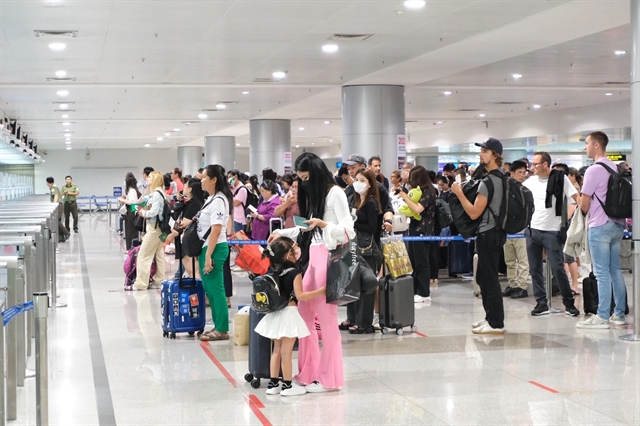 Politics & Law
Politics & Law

 |
| In 2024, Việt Nam welcomed 17.6 million international visitors, approaching its pre-pandemic numbers. Photo thanhnien.vn |
HCM CITY – New visa policies may be implemented to attract top talent and high-net-worth individuals to Việt Nam.
The Việt Nam Tourism Advisory Board (TAB) has submitted an official document to Prime Minister Phạm Minh Chính, proposing several visa policy changes aimed at attracting experts, talented individuals, and the super-rich to Việt Nam.
Specifically, the TAB suggests that the government introduce three visa categories: the Việt Nam Golden Visa, a five- to 10-year visa with renewal options; the Investor Visa, a 10-year visa with a pathway to permanent residency after five years if the required investment level is maintained; and the Talent Visa, a five-year visa with a simplified renewal process for highly skilled professionals.
These programmes could be piloted in select cities with favourable conditions, such as Phú Quốc, HCM City, Hà Nội, and Đà Nẵng.
Additionally, a nationwide marketing campaign should be launched to promote these visa programmes, funded either by state resources or by tourism-related tax revenues to ensure effective implementation.
Risk of Việt Nam’s tourism lagging behind competitors
While Việt Nam’s tourism industry has nearly recovered to pre-pandemic levels, experts from the TAB are concerned that the country risks falling behind key competitors in the region, particularly Thailand and Malaysia.
In 2024, Việt Nam welcomed 17.6 million international visitors, approaching its pre-pandemic numbers.
In contrast, Thailand is only 12 per cent away from reaching its previous 40 million arrivals, while Malaysia is just 4 per cent short of its previous 25 million international visitors.
TAB assesses that to achieve these results, Việt Nam’s competitors have implemented significant changes in their visa policies.
For instance, Thailand has expanded its visa-free access from 57 to 93 countries and increased its visa-on-arrival eligibility from 19 to 31 countries.
Malaysia now grants visa exemptions to 158 nations, and both Thailand and Malaysia have introduced new visa programmes.
Meanwhile, Việt Nam currently offers visa exemptions to only 30 countries.
Additionally, Thailand launched its Long-Term Residency (LTR) Visa in 2022, allowing four categories of foreigners to reside in the country for up to 10 years.
This visa also grants work permits, a reduced personal income tax rate of 17 per cent, and various benefits such as multiple entries and property ownership rights.
This year, Thailand has further adjusted the LTR visa criteria to attract more global talent.
Other visa programmes include the Thailand Privilege Entry Visa and the Thailand Smart Visa, designed for highly skilled professionals, technology investors, and senior executives who wish to live and work in Thailand.
Similarly, Malaysia has relaunched its "Malaysia My Second Home" (MM2H) visa programme to attract global talent and investors.
Singapore is also considered a competitor with several visa programmes aimed at attracting international tourists, wealthy entrepreneurs, and professionals in innovation and investment.
To cater to different categories, Singapore introduced the EntrePass in 2023 for foreign entrepreneurs establishing innovative businesses in the country.
Other programmes include the Global Investor Programme (GIP) and Tech.Pass, designed for technology entrepreneurs and investors.
 |
| Expanding visa policies is therefore not just an isolated solution but an integral part of Việt Nam’s broader strategy, a key tool for driving economic growth. Photo thanhnien.vn |
Disparities in tourism promotion budgets
TAB points out the significant differences in international tourism promotion budgets among Việt Nam and its competitors.
In 2024, Thailand allocated nearly US$200 million, Malaysia $84 million, and Singapore $220 million to promote tourism worldwide.
"In contrast, we do not have exact data on the Vietnamese government's budget for international tourism promotion. However, this amount is certainly insignificant, totaling under $8 million, approximately VNĐ200 billion. Our only previous international tourism marketing programme was funded by the private sector, but it has been discontinued due to a lack of sustainable funding mechanisms and government support," the TAB document states.
Proposal for three specialised visa categories
According to the TAB, the National Assembly has passed a resolution targeting a GDP growth rate of 8 per cent or higher, laying the groundwork for double-digit growth in the future.
Prime Minister Phạm Minh Chính has emphasised the importance of maintaining high and sustainable growth until 2045 as a necessary path for Việt Nam to escape the middle-income trap and achieve its strategic objectives.
To realise this ambitious growth goal, the Prime Minister has issued specific directives to the tourism sector, stressing the need to boost promotion efforts and develop visa policies tailored to attracting international visitors, experts, talent, and billionaires to Việt Nam.
Expanding visa policies is therefore not just an isolated solution but an integral part of Việt Nam’s broader strategy, a key tool for driving economic growth.
Based on this analysis, the TAB proposes that the Prime Minister consider establishing a Visa Policy Reform Committee, which would include representatives from both the public and private sectors.
This committee would evaluate new visa types and incentives that Việt Nam should adopt to align with the Prime Minister’s strategic goals and compete effectively with regional rivals. — VNS




